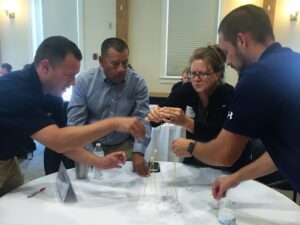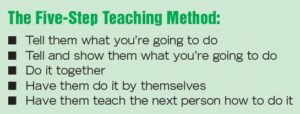Our KASH management development class presents memorable ways to obtain Knowledge, understand why our Attitudes are important, learn to develop Skills in ourselves and others, and work to create long-term Habits that drive our success. This class has been around for many years, but we’ve recently updated it to be more interactive and use experiential learning, which has helped it become a crowd favorite. While the class contains fun hands-on learning activities like making balloon animals, moving “radioactive waste” (represented by tennis balls), and building structures out of raw spaghetti and marshmallows, it must continue to motivate students to transform new ideas into actions. We feel confident in our new approach and continue to refine our curriculum for developing better leadership and management skills in our team members. To measure our success, the training team sends out a questionnaire two weeks after each class. Responses to this questionnaire have been significantly useful when refreshing class content. Here are a few responses from our KASH attendees on what they learned and how they applied these lessons into their daily routine:
it must continue to motivate students to transform new ideas into actions. We feel confident in our new approach and continue to refine our curriculum for developing better leadership and management skills in our team members. To measure our success, the training team sends out a questionnaire two weeks after each class. Responses to this questionnaire have been significantly useful when refreshing class content. Here are a few responses from our KASH attendees on what they learned and how they applied these lessons into their daily routine:
How has your job become easier and/or more productive since attending KASH?
Robert Micklis (CHM): “I’ve become more effective at teaching my crew new things. My past experience with training crew members is that not everyone understands new concepts on the first try. After learning and executing the five-step teaching method, I was able to train my crew with better results.  While this approach invests more time upfront, it provides all crew members with a greater chance of grasping new skills. This translates into better results in the field and a shared sense of learning as a team.”
While this approach invests more time upfront, it provides all crew members with a greater chance of grasping new skills. This translates into better results in the field and a shared sense of learning as a team.”
 Describe how a topic we’ve covered has influenced daily interaction with your team.
Describe how a topic we’ve covered has influenced daily interaction with your team.
Megan Kozik (GAL): “In the morning, before I dive into emails and estimates, I ask the other estimators in the office how their evening was the night before and I tell them something positive that I experienced so that we can start the day with positive attitudes.”
 What was unique about this class that made it effective?
What was unique about this class that made it effective?
Kemper Marable (RIM): “The attitude adjusting role-playing exercises were the most transferable lessons I took away from KASH. I think this lesson could be expanded upon in later trainings by incorporating real-life Ruppert scenarios, such as video testimonials from current employees.”
What would you like to see more of in future training classes?
Bryan Doran (GAL): “I’d like the opportunity to get to know employees from other branches better – maybe mix landscape and maintenance employees and no more than two employees from the same branch at each table.”
Feedback such as this ensures that we retain the effective parts of training and improve areas where needed, whether is it something as simple as seating arrangements or something more involved like ensuring our managers have a reliable method to train their crew. KASH continues to evolve and elevate our management skills so that we not only out-hustle the competition, but provide better leaders for our teams and problem-solve effectively in our daily routines.

 Describe how a topic we’ve covered has influenced daily interaction with your team.
Describe how a topic we’ve covered has influenced daily interaction with your team. What was unique about this class that made it effective?
What was unique about this class that made it effective?